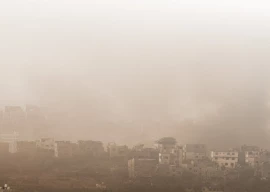
Outside the capital, attackers also targeted government buildings in Logar province, the airport in Jalalabad, and a police facility in the town of Gardez in Paktya province.
Taliban insurgents claimed the attacks with a spokesman saying they marked the start of their annual spring offensive which heralds the fighting season, adding that "a lot of suicide bombers" were involved.
NATO has about 130,000 troops supporting the government of President Hamid Karzai against the Taliban insurgency, but they will pull out by the end of 2014, handing control of security to Afghan forces.
A spokesman for NATO's International Security Assistance Force (ISAF) told AFP that Afghan forces, whose ability to withstand the Taliban after 2014 has been questioned, were taking the lead in countering the assaults on Kabul.
But the latest in a series of spectacular attacks show militants still have the ability to strike at the heart of the capital and raise fears over the precarious security situation as NATO troop withdrawal approaches.
In September last year Taliban attacks targeting locations including the US embassy and headquarters of foreign troops in Kabul killed at least 14 during a 19-hour siege. And in August, nine people were killed when suicide bombers attacked the British Council cultural centre.
On Sunday several attackers tried to enter the Afghan parliament but were engaged by security forces and driven back, parliamentary media officer Qudratullah Jawid told AFP. They had taken cover in a building near the parliament, he said.
MP Mohammad Naeem Lalai told AFP lawmakers joined the security forces in firing on militants as they tried to storm the parliament, which was in session.
At least two attackers were killed, interior ministry spokesman Sediq Sediqqi said, as militants targeted several areas of the city.
"Near the parliament, the first floor of a neighbouring building has been taken by police and one terrorist is dead," said Kabul police chief Mohammad Ayoubi Salangi.
In two other areas of the city militants had taken positions in tall buildings and were firing, he said.
A police spokesman retracted an earlier report that the Kabul Star Hotel had been taken over and was on fire, saying the militants had occupied a neighbouring building.
The main area under attack was close to the embassies of the United States, Britain, Germany and Iran, as well as offices of the United Nations, NATO's UNAMA, the ISAF-run Camp Eggers, the entrance to the presidential palace.
The French, Turkish and Chinese embassies are not far from the site.
A police spokesman said the areas under attack were the diplomatic enclave of Wazir Akbar Khan in the centre, parliament in the west and District Nine in the south, where there are several foreign military bases.
South of Kabul in Logar province, several suicide attackers entered government buildings, including the offices of the provincial governor, police headquarters and a US base, deputy provincial police chief, Raees Khan told AFP.
In eastern Afghanistan two suicide bombers blew themselves up at the gates of Jalalabad airport, wounding several people, General Jahangir Azimi, the airport's head of police said.
In Gardez, in the eastern province of Paktya, multiple Taliban gunmen -- believed to be armed with suicide vests -- launched an attack on a police training centre, Rohullah Samoon the provincial spokesman told AFP.
They occupied a building overseeing the facility and opened fire with machine-guns, he said, wounding four civilians.
As the Kabul attacks began, several large explosions and bursts of gunfire were heard near the United States embassy.
The embassy sounded alarms and warned staff to take cover. Embassy spokesman Gavin Sundwall said the building was in lockdown but all staff were accounted for and safe, with no reports of injuries.
The German, Japanese and Russian embassies were also targeted although no casualties were immediately reported.
A German foreign ministry spokesman said the "grounds of the German embassy" had sustained damage but that "as far as we know (there have been) no injuries".
Japan's Kyodo news agency said three rockets landed in the Japanese embassy but nobody was hurt and staff had evacuated to a nearby air raid shelter.
Zabihullah Mujahed, the Taliban spokesman, told AFP by phone from an unknown location, the attacks were a message to the Kabul government and its Western military backers.
"The Kabul administration and the invading forces had said some times ago that the Taliban will not be able to launch a spring offensive. Today's attacks were the start of our spring offensive," he said.
Haqqani network involved?
The Afghan government's Interior Ministry said on Sunday that initial intelligence on a wave of insurgent attacks across the country pointed to involvement of the militant Haqqani Network.
"It's too early to say, but the initial findings show the Haqqanis were involved," Interior Ministry spokesman Sediq Sediqqi told Reuters.
Sediqqi said figting had ended in the eastern provinces of Paktia and Nangarhar, but continued in parts of central Kabul including the upmarket Sher Pur neighbourhood and a major supermarket favoured by expatriate Westerners.
COMMENTS (75)
Comments are moderated and generally will be posted if they are on-topic and not abusive.
For more information, please see our Comments FAQ





1734846750-0/Untitled-design-(96)1734846750-0-270x192.webp)

















@US CENTCOM: Dear Major Nevers, Thank you for your article, but you are using incorrect nomenclature when you refer to the Taliban as terrorists. The Taliban were the recognized Government prior to American occupation of Afghanistan, and therefore should be referred to as "Freedom Fighters" or "Guerrilla Fighters". I prefer the term "Guerrilla Fighters" which has been a well known term in the English language since about 1809, and is understood by most English speakers. However, for the few who do not, the term "Guerrilla Fighters" refers to an irregular group of combatants who fight behind enemy lines in their own country, attack the enemy, in their own country, using tactics such as ambush and quickly withdraw. The term "Terrorist" is more appropriate when it is applied to fighting groups such as MEK, MKO. JUNDULLA, PKK, PAJK, and others. "Terrorists" are groups of fighters who are trained by foreign countries to create terror in another country. It is quite difficult to actually define terrorism, but the groups mentioned are reasonably good examples of terrorists. They are basically trained by Western Powers to infiltrate and disrupt countries they disagree with. Libya and Syria are good examples of this. Obviously, it would require many words to fully describe what terrorism means, but the few above may help you. Additionally, it may be to your advantage if you brush up on "The Articles of War" outlined in the Hague and Geneva Conventions. Western countries appear to completely ignore the Conventions, but we have to start somewhere.
There are certain powers that do not want NATO withdrawal from Afghanistan. No matter what they say in public. The reasons are quite obvious,
A. NATO withdrawal would mean end to revenue from transit rights.
B. It would also mean end of 'Aid'.
C. The money being paid in the name of reimbursement of costs for cooperation in 'War on Terror' will also stop.
D. Strategic assets, once they have control of Afghanistan, may start looking for 'Strategic Depth' of their own. And the do have sympathisers all over the place.
End Result- Make all kinds of Noises, Bargain Hard, but keep the Buyer of Services in the Market.
@US CENTCOM: Dear Major Nevers, I thank you for your contribution to this debate. However I must point out several salient points. 1) The invasion of this sovereign Nation was a heinous war crime a war of aggression a crime against humanity! even the German Wehrmacht respected the Neutral state of Switzerland and once allied soldiers crossed that boarder no further response was instituted yet your drones violate that boarder of an ally almost daily killing civilians another war crime and act of aggressive war! 2) Major you really need to brush up on the articles of war contained in the Hague and Geneva conventions. It is abundantly clear the the ISAF, NATO, US forces have committed war crimes almost daily. The articles of these conventions are clear under these circumstances even Afghan civilians have the right to engage and kill these troops, not only that the articles calls it a duty to do so to prevent further war crimes. 3) The Taliban may be do not abide by western standards but there again neither do the coalition troops, the taliban are neither terrorists or insurgents they are in accordance with the Geneva conventions freedom fighters guerrilla forces fighting illegal international war criminal forces of occupation! On the contrary Major the coalition forces days are numbered they are not winning! the Taliban are! This war is draining the participants treasuries at an ever increasing rate Bankruptcy looms large. The Taliban will still be there long after America leaves, The daily anti US demonstrations by the afghan people should tell you you are not welcome! But for the fact that the participants own the UN and the Hague tribunals you sir and all your senior officers would be facing the same fate as the German military at the Nuremberg trials, Hanging or long very long prison sentences for your crimes! The continued us of banned materials including up value nuclear devices says it all Should a war with Iran develop the occupying forces will face another hazard of their own creation! bombing Iran's Nuclear facilities will shower Afghanistan in radio active nano particles. everything the coalition touches, everything the Air they breath the food they eat, the water they drink will be contaminated, there will not be need for US military suicides it will be a de-facto self inflicted event! In conclusion Major the coalition is on very shaky legal quick sands that could well suck them into oblivion!
PatrioticPakistaniPashtoon
Bravo, brother. What an answer. The only true bond, true relationship is the bond and the relationship of Islam. And those who love Islam love Pakistan, not some ethnic Pushtoon, Sindhi, Balochi, Kashmiri identity! May Allah increase your tribe in Pakistan.
@Noise: Dear Major Nevers, Noise, I am sorry gentlemen. You can live in fantasy land as long as you wish. However, if you put Iraq and Afghanistan together a minimum of five million people are dead as a direct result of U.S/NATO invasions. Many of the deaths are caused by bombing and destruction of infrastructure. This has surpassed holocaust death rates, and we still do not know the full extent of the problem at this stage That is because people are still dying and the U.S./NATO forces only advertise what their enemies do. We will have to wait a few years yet before the full extent of these brutal wars start to become apparent, and even then it will take dedicated research and statistical inference to produce any sort of accuracy. I doubt if the Pentagon will produce realistic figures.
@ US CENTCOM,
And what do you think what the NATO has been doing for the past 11-12 years in Afghanistan. Slaughtering innocent people similar to the so called terrorists. So what is the difference.
@Tony C Most of the Afghans killed have died at the hands of other Afghans not at NATO hands. The Taliban have killed many more civilians than NATO both before of after the invasion. Case in point this story we're commenting on. The NATO is handling Afghans with kid gloves. They lost in Iraq and they're losing in Afghanistan because they dont have the stomach to do whats necessary to win.
The blatant attacks could have killed hundreds of people, but due to the bravery and quick response of the Afghan and ISAF security forces, the damage to innocent human lives was limited, although more than 36 terrorists were reported killed. We forget that we are still fighting a war against ruthless terrorists who have no regard whatsoever for human lives. They know that their days are numbered, and in desperation they again were testing the resolve of the Afghan forces and people. Did we not see Afghan people and forces face the dangers bravely and courageously take on the killers?
Whoever calls these terrorists anything but killers does not know the ground realities. People of Afghanistan have rejected violence and the atrocities of the terrorists, be they Al-Qaeda, Taliban or any other terror groups. It is time to call a spade a spade and not make them heroes. They are not!
Maj David Nevers DET-United States Central Command www.centcom.mil/ur
@Noise: Dear Noise, Why don't you ask the relatives of the three and a half million dead Afghans (U.N. statistics) whether they think U.S./NATO puts on a humane face. There is a similar number of refugees, and we do not really know about the seriously injured, homeless and destitute who's children go to sleep at night both cold and hungry. Further, the majority of the Afghans killed were children under five. However, now that you have brought geography into the equation it would appear that a line drawn from East to West and passing through Kabul is approximately 1,000 kilometres. If you divide this by 3,500,000 people it works out at 3.5 people per metre. It really looks as if the brave, humane U.S./NATO lads are following the Roman traditions rather well, don't you think?
@Tony C. If NATO wanted it could have carpet bombed those villages and shot everything that moved. That would have won them the war easily. Their problem is that they seek to project a positive image to the world and they are willing to sacrifice victory in Afghanistan simply to preserve their civilized self-image. They believe that the humane image that they project will bring them greater gain in the long run. Otherwise if this were the ancient Romans the the Taliban were facing there would have been a line of of crucified men hundred of miles long besides the road to from Helmand to Kabul. That would have broken the Afghan's spirit of resistance for centuries like it broke the spirit of the ancient Gauls. It takes a barbaric tactics to defeat people with a barbaric mindset. Be thankfully the west has progressed intellectually beyond barbarism, otherwise they would have done whatever it took to win, be it WMDs or genocide.
A fool always considers his enemy's restrain and patience as weakness.
@Afghan Karachiite: Dear Afghan Karchite, It is my understanding that the foreign invaders are keeping themselves secure in heavily defended bases. They are very worried about Taliban ability, and do not venture out unless it is absolutely necessary. They really are much better at leaving their bases in armoured vehicles, making unscheduled attacks on undefended villages, killing unarmed Afghans, and going back to base quickly before Taliban reprisals start.
@Adnan:
You will be as true Muslim as your beloved Afghan Taliban if you can say the same about TTP.
By the way, all the 35 suicide bombers were able to kill only 8 Afghans (no foreign invader). Does it mean their Imaan was not strong enough?
@MyHeartSpeaks:
also even without technology (i.e. Taliban have no drones, no helicopters, no humvees, no daisy cutter, no B52) Talibans have the technology of Imaan which these foreign invaders don't have. Beat it if one can!
Taliban alone seems to be more organized here than NATO, ISAF, US Forces, even after the departure of OBL to another world, also even without technology (i.e. Taliban have no drones, no helicopters, no humvees, no daisy cutter, no B52). It's a clear message of foreign forces to LEAVE AFGHANISTAN ASAP.
well interesting to say that, after all the intelligence couldn't smell even a thing of 150 people with weapons attacked sorry (raided) in a disciplined manner.Subsequently taliban went on to attack in kabul coordination amazingly. "Response" Foreign minister Hina Rabbani Khar has intrestingly said consistently encouraged dialogue to resolve. What??
@Patriot Afghan:
You people already has been stabbling us on our back for 30 years by being immigrants on Pakistani soil. Try to be a bit thankful, will you?
@Rizwan:
LOL! Well said!
@Siraj:
Since when invading forces became innocents? Are you redefining the history as well as dictionary?
@mr. righty rightist:
Or may be Mobilink Network?
Must be a mourning day for Kalay Angraiz aka Pakistani liberals.
accept our transit terms for NATO supply other it would happen like this.. same day 400 prisoners escaped, same day co-ordinated attacks it tells what
Welcome to Somalia of the future. All the necessary actors are in place to descent Afpak to that low lawless situation. May be the prediction of end of the world is true only for this area. I am wondering do we need to repeat what happened in Hiroshima and Nagasaki and start fresh? It appears that some people in this part of the world can not stand a sight of foreigners. All head of state, international sports teams, investors, actors, dance performers and NGO’s have stopped coming to this part of the world. Only diplomats were left and this attack on them will send them packing. Then same people wonder why we are poor and do not have power or poor law and order situation in their neighborhood. It certainly looks like a graduation party for non state actors. Investment on terror infrastructure is paying off. Somebody is about to get promoted and new batch of recruits are brought in.
This all will fall on Pakistan shoulder now to curb the Haqqani network. It is reply to Pakistani Parliament resolution on War against terror and US Pak relations. Now we will be blackmailed.
400 Prisoners 'escape' from Banu.
And then comes this attack.
Smells like Strategic Assets being given Strategic Opportunity to gain Strategic Depth.
I think I should thank Pakistan for giving such a beautiful gift to Afghanistan in the form of Taliban, I am sure we would return your favor in future, as we know Afghans do not leave their enemies. I am sure you guys will be very happy for what happen in Afghanistan today, but mark my words this will be the future scenerio of Pakistan's situation,, As a muslim I always defended Pakistan when compared to Indians or Americans but today I think I was wrong, Pakistan can never be friend to Afghanistan,, I think we are better of Pakistan, we should make alliance with Indians and United States coz they don't stabe us in the back.
@Faesal: Get real.... now!!
US and NATO troops have proven themselves of the same quality as our FC troops and police. Completely useless.
Just imagine the scenario when Military of other countries leave Afghanistan.
@Dr Priyanka: The same reason for which Pakistani Talibans would never attack Delhi!
wow..... why the heck is U.S not using the sci hi fi gadgets which they use in hollywood to decipher and blowup anything anywhere in the world. i think the beyond visual range equipment is beyond visual range!!
"lawmakers joined the security forces in firing on militants as they tried to storm the parliament, which was in session". Ahan, so this is how it works once your country is war plagued for more than 30 years.
@jamal: If Taliban did not want to be invaded they would not have allowed Osama and Co. to setup terrorist camps in their country thereby putting the security of Afghanistan at risk. The US did not go there for picnic. The world pleaded with the Taliban to hand OBL over but they did not and did not care about the consequences. Same OBL who, before the Afghan war did not care US arms and logistical aid to fight the Soviets. He had a change of heart and remembered all his grievances once the Soviets left. People have selective memories but facts on the ground cannot be pushed under the rug!!
Who controls Bannu and Kabul Talibans,its is good name to be used anywhere as Al Qaeda was being used to ruin the muslim countries by USA.
Taliban are answerable to no-one. period
@ Afghan.....you are right. These Talibans want US to stay on.....for whatever reasons........ They don't even hurt them!
U.S./NATO keep telling us that the military situation is improving, and the Taliban are loosing ground. If the latest Taliban attacks are any guide I would hate to see them winning. Unfortunately for the U.S. it is my understanding that Osama bin Laden once said : "we do not want to win this war. We want to keep the U.S. fighting and send them bankrupt". It appears that this strategy is working, and has been for eleven years. The U.S. Current A/C Debt Clock is running at just under 16 trillion dollars and climbing, plus total unfunded liabilities being well over 200 trillion dollars. One has to feel sorry for the poor American people whose standard-of-living is falling daily as the Debt Clock rises exponentially. .
The Pakistani army needs to stop secretly supporting the Taliban...they are going to destroy our country, like they are destroying Afghanistan. Anyone mention that suicide bombing is contrary to the principles of Islam?
@C. Nandkishore, only in your dreams
@jamal It'll mean years of civil war between the Taliban leading the pathans on one side and the Hazaras, Tajik and Uzbeks on the other. The Taliban will give no future of either Pakistan or Afghanistan.
Have you forgotten that how the Afghans cheered when the Taliban government fell?
I really, really hope ISI is not involved in this !!
Good to see that afghans are still fighting valiantly against invaders despite 11 years of occupation and oppression.hope they will not give up unless every single foreign troop evicts their country.If talibans achieve victory against invaders,this will be great news for the peace loving peoples areound the world.
@C. Nandkishore: And day after tommorow Delhi.
These terrorists have only one motto behind attacks like these: to provide an excuse for the US to stay in Afghanistan for longer than 2014. The reports may come up soon and you will learn that none of the "foreigners" were hurt in the incident and all the dead and injured are local Afghans.
As long as the victims are common Afghans and the Nato/Isaf soldeirs do not receive any causalities; all is well for the westerns in Afghanistan.
@those who think that things could get better once the US leaves Afghanistan:
There were no US troops in Afghanistan when these Holy Taliban burnt down the entire villages in the North, shooting down even children of their rivals calling them the "offspring of snakes" and chopping off hands and legs of people.
@Pakistanis:
This is not an attack on the US/Nato/Isaf, it's an attack on Afghanistan. The insurgents can easily kill dozen of western soldiers in such attacks, who roam around the streets of Helmand, Kandahar, Zabul and Ghazni on foot-patrols. I can sense the hidden pleasure you have about the incident of today, but mark my words this spreading fire is closing around your country too.
its an act of revenge. if afghan military and nato forces killing about 50 taliban everyday, then why taliban will remain silent?? haqqani group is a part of taliban movement, and surely they are involved. what the big fuss about it.!!!
I think since Osama is out of the picture the US and NATO must leave. Enough is enough. If terrorist training camps are setup again in Afghanistan, they could be taken care of by aerial assaults. With Osama gone, foreign forces in Afghanistan are being perceived as invaders and invaders only.
Pakistanis, though themselves victims of countless terrorist attacksthre unbelievably joyfull in the face of attacks anywhere else. At the end of the day the victims of such attacks are Afghan's and people in Pakistan should stop assuming knowing what is best for the Afghan people.
@syed: how well did you control violence in Karachi city !!
@Pakistani: do Pakistanis knows about this in advance and stage that jail break attack to portray themselves as victims as well ? Sme " ZDo takay Ki Hindu Mentality" Afterall, how the world will know that how low life you people are. By the way, Is this How you Planned the Mumabi Attack and blame others for that? Looks lie quite a conspiring Hindu Mind. Isn't it?
@C. Nandkishore: Fine. Today Kabul. Tomorrow Islamabad.
And Next New Delhi. Get prepared Mr. Narendra Modi. It's easy to buy judges and get away from Justice after Murdering 2000 Muslims. Talibans May not let you run away...
This is bad, such things should not happen. It affects the peace process
@Dr Priyanka ... yeah Inshallah.. one day the flowers of Peace will bloom once again in the gardens of Afghanistan... and its wonderful odour will refresh the minds of nieghbouring Pakistanis, Indians and Iranians....Inshallah
@Siraj: Please do not bring Islam in it. My dear this is a war and in war both sides fight not one side. You mean otherside can kill as many as they want and these people just see their children to be killed and od nothing??? They will respond.
well it was expected... now US will have another reason to pressurize Pak. CIA doing damage internally , sectarian kilings in quetta, khi, HAARP technology used in Siachin, direct attack on Salala post.. all chained. Now be ready PAK....
@C. Nandkishore: No they won't. There are certain reasons for that!
@Abdul Qayyum Bhatti: NATO/ISAF forces do not guard the Diplomatic area in Kubal Afghan guards do.
We heard the massive expositions and firing. Everyone is safe mashallah.
@pashtun: You are right. We should pray for all Afghans! The brave people! Afghanistan will come out of this difficult situation one day!
Fine. Today Kabul. Tomorrow Islamabad.
What the Hell these Western forces are doing in Kabul? If the NATO/ISAF could not secure the Diplomatic area in Kabul then how can they secure the whole Afghanistan?
is there any one can say, this is what islam says to kill inocent people and call that Jehad?
I think instead of discussing these things... better v pray for our AFghans to be safe and sound
The Haqqani network seems to be only worth these useless strikes...which is more of a show, than any real threat. This is more of a statement than a threat.
Best wishes to the people in Kabul. May they emerge from this stronger and more determined to defeat the Taliban.
Very sad! These are people on a mission. When these cowards become insecure they target innocents! Why don't we have a one to one judo or karate fight. Then we shall know who is the tiger! Looks like there time has come!
No no no.... This is hafiz saeed o.O! Am i right Mr. US and Mrs. India?
do Pakistanis knows about this in advance and stage that jail break attack to portray themselves as victims as well ? :P
And I say again... ISI has no involvement it it
Conspiracy by CIA.
This is a war with no end, no result, no morals and no victory. It was only add to devastation, misery and hostility. This is what IK has been saying all along and this is what the Americans have stared to learn now. We dont need this war and we should not be part of this war. Most importantly we must stop slaughtering our citizens to get a few dollars.
well done, now USA & british can pack their bags and GET OUT.
or wait, it's better to make afghanistan a grave yard of these killers, so hold on till 2014 or better 2050,
well done taliban, Allay bless you
and you know what's the next allegation on Paksitan..."The 400 inmates that broke from Bannu Prison were responsible for this"
These are warnings for the Americans to move out of the region quickly. Afghan Taliban insurgents are controlling 33 out of 34 provinces in Afghanistan already. Very soon they will form a government in Kabul after the ouster of Karzai.
the americans in this 12 years of fight .....are not able to controll TALIBAN......EVEN IN THE KABUL CITY.......................how you people expect this FROM OUR SECURITY FORCES????................